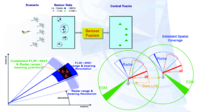
Photo from wikipedia
Soft sensors are widely used in many industrial systems to monitor key variables that are difficult to measure, using measurements from other available physical sensors. Because physical sensors are susceptible… Click to show full abstract
Soft sensors are widely used in many industrial systems to monitor key variables that are difficult to measure, using measurements from other available physical sensors. Because physical sensors are susceptible to faults, it is crucial for soft sensor models to be robust against them. Recently, deep learning has shown promising results in developing data-driven soft sensors for various applications. However, existing learning-based soft sensors are still vulnerable to sensor faults, which could deteriorate the performance of the models. In this article, we propose a deep learning-based modeling framework for developing soft sensor models that are robust to sensor faults. Due to the difficulty in obtaining datasets that cover all possible sensor fault characteristics, the proposed framework is developed to be zero-shot such that the model can be trained with only fault-free dataset without requiring any sensor fault patterns, thus greatly saving the time and resources needed to collect such data. Instead, adversarial examples are used as a proxy for faulty sensor inputs so that the model can learn to be adaptive through the proposed two-stage, uncertainty-aware recurrent neural network architecture. We demonstrate our approach to the TE benchmark process and a real industrial multiphase flow process and show that robustness is achieved as the accuracy does not degrade significantly when sensor faults are present during the model evaluation.
Journal Title: IEEE Transactions on Industrial Informatics
Year Published: 2023
Link to full text (if available)
Share on Social Media: Sign Up to like & get
recommendations!